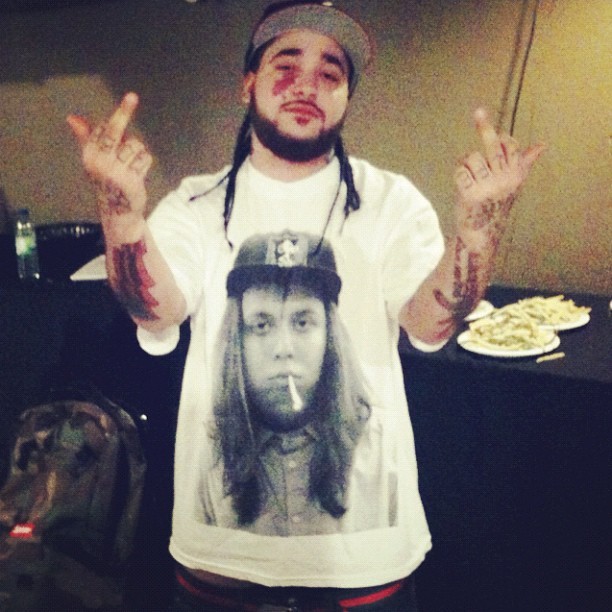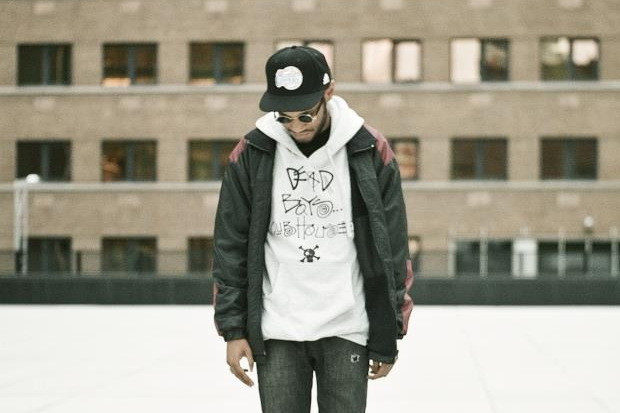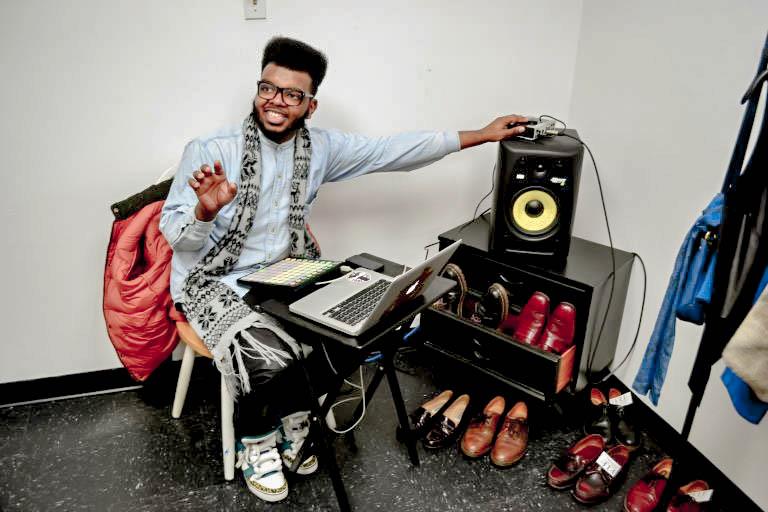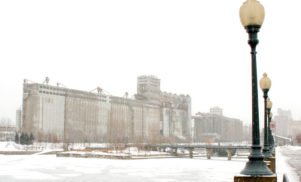Montreal: birthplace of Celine Dion, home of the world’s most celebrated form of chips and gravy, and – increasingly, it seems – the hometown of every other musician that FACT covers.
From Blue Hawaii to Lunice, Prison Garde to Purity Ring, and Jacques Greene to d’Eon, we seem to be writing about the city with reassuring regularity. FACT was at the city’s fantastic Igloofest this January, an annual festival in the town’s port that features entire venues made of blocks of ice and steel girders (take that, Green Man), where we caught up with some of the acts from the city that we’re most excited about – several of whom had played the festival’s second, more locally-focussed, stage.
Use your keyboard’s arrow keys to turn pages (page 1/5)
What’s your background? How did you get started making tunes?
“I was born in Haiti, raised in the south shore of Montreal. I always loved music because of my dad and my big sisters. He was playing a lot of music around me from Michael Jackson to Pink Floyd and other types of stuff. And my big sisters had this tape of 90’s music videos with hip-hop and r’n’b. So that’s kinda where it all came from. Back in 2006, I was djing at first but then my brother showed me how to use FL Studio and since that day, it was on.”
Were you brought up in Montreal? And how do you find it coming up as a musician there? It seems really open to supporting culture.
“It’s really cool. In Montreal they got their scene and they got a lot of festivals and events about the hip-hop and electronic scene. It’s cool that I’m an upcoming artist from Montreal cause I feel like if I were from another place it wouldn’t be the same at all.”
Tell us about how Artbeat formed. That’s your crew, right?
“Artbeat Montreal is group of all the beatmakers from Montreal reunited. They started their events to give unknown Montreal beatmakers to give them a little of shine. The first time I did a show in Montreal was with them and that’s how I started to gain my respect as a beatmaker. It’s not my crew, it’s more of family thing.”
Your music, or the stuff I checked out at least, has that really tight combination of quite classic sounding hip-hop sounds – strings, down-tempo drums – but then it’s got those really wild, panned synths. I know it’s always a weird question, but what do you think defines your tracks? Like what are their characteristics?
“I don’t know, maybe dark but positive at the same time. I always think of a situation that it’s a party at night and people are dancing or dudes bobbin’ their heads with stink face in a studio. I always think myself as a big DJ and the crowd going wild when a drop comes on.”
I’m guessing you send beats to a decent amount of rappers – is it mostly local people, or people from the States, Toronto, etc? And when you’re working with rappers in Montreal, are they generally French-speaking or English?
“To be honest, I only give beats to the people around me like my brother – I’m working with him as The Celestics – and to my homies like Green Hypnotic so it’s mostly local people rapping in English. Other rappers are like too hype to jump on some tracks from my beattapes and claim that I produced for them.”
Who else from Montreal should we be keeping an eye on?
“You guys should checkout Da-P, he’s underrated as hell and to me he’s the best kept secret but hopefully people will get to hear his stuff and he’ll be atleast known like me, Tommy Kruise, High Klassified and all of them.”
How’d you get the name, anyway?
“I got it randomly, Kaytradamus was my stage name before, I got from Nas’ album Nastradamus, thought it would be unique but Flosstradamus got popular before me.”
So how did you get started?
“I’ve been making music since 2009, I don’t really have a musical background, but my cousins and my brother used to rap and I wanted to be like them but instead I started to fool around with FL Studio and here I am today!”
Most of the stuff on your Soundcloud seems pretty down-tempo – is that the kind of vibes you find yourself leaning towards?
“It really depends on my mood, at that time I was really into laidback trill music, kinda like A$AP Rocky type of joints so I went toward those kinds of sounds, but I can pretty much mess with any style! My next project will actually be a bit more hightempo.”
I caught some of your set at Igloofest, which had totally different rhythms to the 4×4 stuff on the main stage. Are crowds generally receptive to different rhythms in Montreal, or is there still a 4×4 dominance in the air the way there is in London?
“At the moment, 4×4 is really dominant. I decided to play my kinda of rhythms since I’m quite sure I got booked for that, the crowd was really responsive which was pretty nice.”
Is it mostly local rappers you work with? And are they generally French-speaking or English?
“I mostly work with artists from Canada since I’m a really commucative person I like to talk and sit with the artist so we can both share our ideas. I work with some artists from the states but not that much, I’d be down to work with more though.
Montreal seems to have a ton of funding for culture stuff, do you find it easy being an artist here?
“Being an artist in Montreal is not that easy, since now everybody is art-related since everything is easily accessible! You have to be really different and innovative to make your mark as a good artist, and I think it’s the same for every other country and cities.”
How did you get started in music?
“I’m from Quebec City, I used to live on a farm there. My parents got me internet really early in the game, so I was downloading like, discographies – you know, WinMX, Kazaa, Napster, I’m from that era you know, Soulseek, Bearshare. I was a big consumer, I used to buy a lot of music [too], and I reached that point where I was like ‘ok, I should try and make beats’. So I downloaded FL Studio, but I never got around to finishing a beat until I met my friends Kevin and Lunice, who were round my place and telling me I should get my stuff out there.”
“I’ve played Toronto since then, New York – I still don’t understand because it started as a joke. Though the joke seems to be becoming more and more fun.”
What are the parties like that you play / throw in Montreal?
 “As far as small shows go, a lot of people get good opportunities. The people I know, we’re all doing our thing now – there’s the pew pew movement, like an experimental movement – they call it Piu Piu because they use those laser sounds, those zaps. The house stuff here is cool, too.”
“As far as small shows go, a lot of people get good opportunities. The people I know, we’re all doing our thing now – there’s the pew pew movement, like an experimental movement – they call it Piu Piu because they use those laser sounds, those zaps. The house stuff here is cool, too.”
“Before Artbeat, the hip-hop scene here was a bit goofy. Now rappers can show up to an [Artbeat] event and know what sort of stuff they’ll be rapping on in four months’ time. It’s cool, it motivates you when it sees that everyone’s doing something different.”
Who should we be looking out for from the city, and what do you have coming up?
“Kaytronada, High-Klassified, Seb Diamond, Jacques Greene, Lunice – all those guys. As far as I go, I’ve got a release coming on Jacques Greene’s label, Vase, it’ll be more cloudy type of stuff – super slow vibes. I’m working on an album with American rappers, a few mixes coming up, and I hope it keeps going that way. I’m excited for my team”.
How did you guys meet?
“We both grew up in the US. Drew in Hawaii and Brendan in Vermont. We both were fond of music from an early age but where we lived certainly affected our taste and kept us somewhat in a “bubble” as far as what we were listening to. This was all before the “EDM” craze in the US and both us of came to Montreal for University with no real knowledge of any dance music whatsoever.”
How do you find it coming up as a musician here?
“While neither of us are from Montreal, the city has played a big role in raising us as musicians – we really were uninitiated newcomers when it came to this world. I think in a lot of other cities this would be an intimidating position to be in, but not in Montreal: from the get go we were welcomed and encouraged by people who we looked up to that were more established in the city. I remember hearing a set from the guys who are now Prince Club and going home and looking up their MySpace to find out more about the type of house they were playing. I sent them a message to let them know how much their set inspired me, and a few weeks later I was at Max’s house listening to his vinyl collection.”
I’ve met you before in London, which seems kind of the opposite of Montreal to me. How would you describe the city?
“I think you definitely are right about the opposing vibes of the two cities, and I really enjoy being able to bounce between the two since my parents now live out in London. The immediate difference probably is the speed of things in Montreal, it’s more laidback than a city on the scale of London or New York. There’s kind of a two-sided nature to the city simply because of the really extreme version of winter here, and there’s dual language aspect as well. There’s a lot of unique aspects which really set it apart from any other Canadian or American city, and it really has an independent identity which allows for people from this city to really do their own thing.”
You’ve been working with Main Attrakionz – how did that connection happen? And were you ever working with smaller, local MCs?
“Well the genesis of [Grown Folk] was definitely our mutual love for hip-hop, which is really at the root of a lot of what we do musically even though we work in a house context. We have a really collaborative relationship with Aidan at Templar Sound, so we’re always bouncing ideas back and forth with him, and we we had this set of hip-hop beats that were starting to develop. We all agreed that it would be really cool to get some vocals for the tracks, and Main Attrakionz were pretty much our first and most obvious choice. We had been listening to 808’s and Dark Grapes II pretty religiously, and we really felt like we were working from a similar place sonically. We sent out a feeler email with the beats and Squadda immediately responded and wanted to work together. This ended up becoming the Cloud City EP, and was the beginning of the Grown Folk and Main Attrakionz connection which runs pretty deep now.
“We’ve always been really open to working with smaller local MCs and vocalists, and are always on the lookout for local talent to collaborate with. There’s a few projects that are brewing but they are in the really early stages right now.”
Does the French/English language “divide” affect how music works in Montreal at all?
“It might on the bigger more mainstream arenas of music, but in terms of the underground strains not at all. Almost every party that we play at or attend has a nice mix of Anglophones and Francophones dancing, partying, and falling in love together.”











































